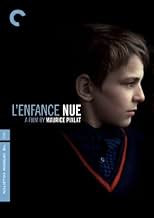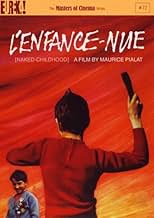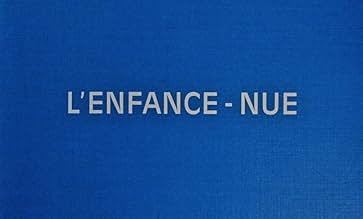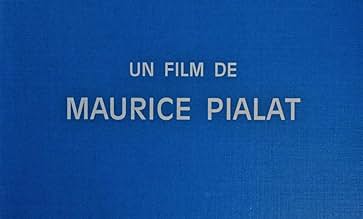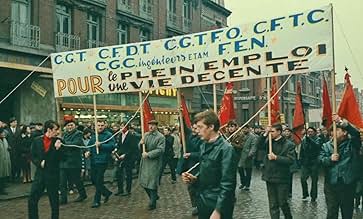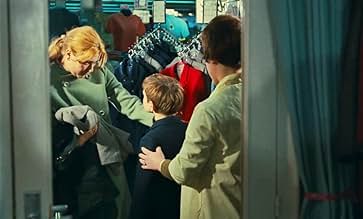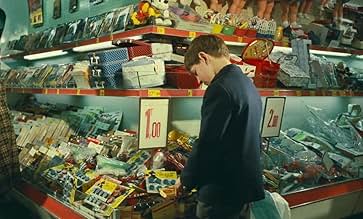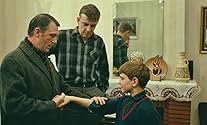VALUTAZIONE IMDb
7,4/10
2794
LA TUA VALUTAZIONE
Un bambino affidatario angosciato si arrabbia e mente mentre i suoi genitori adottivi fanno del loro meglio per amarlo e prendersi cura di lui.Un bambino affidatario angosciato si arrabbia e mente mentre i suoi genitori adottivi fanno del loro meglio per amarlo e prendersi cura di lui.Un bambino affidatario angosciato si arrabbia e mente mentre i suoi genitori adottivi fanno del loro meglio per amarlo e prendersi cura di lui.
- Regia
- Sceneggiatura
- Star
- Premi
- 1 vittoria e 1 candidatura in totale
Recensioni in evidenza
This is Maurice Pialat's debut movie and François Truffuat offered him to produce his first effort. Not only because he was at the time a seasoned filmmaker (a dozen of films so far for a man who was 36 years old whereas Pialat shot his first film when he was 42!) but because the topic could only please him. Indeed, Truffaut's first film, "les 400 coups" (1959) revolved around the same subject and was a big critical, commercial hit. However, Truffaut like the rest of the crew who worked with Pialat wasn't prepared to the director's unconventional shooting methods and consequently the two men will never talk to each other again for several years.
Pialat used to say that he refused everything planned in the shooting of his films and "l'Enfance Nue" was inescapable to this scheme. Better, it was indispensable to have a genuine, deeply moving work as a result. Created in the chaos with tensions and having to rely on a shoestring budget, "l'Enfance Nue" is part of the top five films about stolen childhood alongside Julien Duvivier's "Poil De Carotte" (1932) and Luigi Commencini's "Incompreso" (1966). What "les 400 Coups" tried to reach, "l'Enfance Nue" achieved it. It's a much stronger flick than Truffaut's very overrated work. The piece of work from the former critic at the fusty "Cahiers Du Cinéma" suffered from a loose narration and cardboard characters which made it a bit humdrum to watch.
Given the two other films Pialat gave us after his 1969 vintage: "Nous Ne Vieillirons Pas Ensemble" (1972) and "La Gueule Ouverte" (1974), these three films have often been perceived as a sort of trilogy of life and Pialat's treatment of stolen childhood is drastically different to Truffaut's. He opted for a nearly documentary approach and tried as best as he could to reproduce working class life as it was in the Northern France of the sixties. A method he will tap again with gusto for his next two films. And you can only marvel at Pialat's remarkable camera work and observation. The hero François is a cruel child, perhaps worse than Antoine Doinel who never threw a cat from the top of the stairs! He goes from household to household because his adoptive parents can't stand his cruelty. He's not the only one like that. At the beginning of the film, Pialat shows us numerous orphans in an orphanage who can't manage to find adoptive parents. But when François is put up by an elderly couple, he seems to have found human warmth and comfort from them. Feeling Pialat manages to convey to the audience in an astounding way. You must be tender towards the attention these little old people give to François like when Granny offers him a piece of cake after François was involved in a fight. And in a sequence close to "Cinéma Vérité", they talk about François with their own words and how much do they understand him! More than François's tragic story, Pialat's work encompasses a word picture of Northern France with its ways of life. His depiction is all the more genuine as he hired non professional actors who are in their own roles. During the shooting, Pialat used to write down excerpts of conversation these inhabitants had and to incorporate them in his film. This process of hiring "gifted amateurs" will be tapped again thirty years later for another film set in Northern France: Bruno Dumon's harrowing "la Vie De Jésus" (1997). Anyway, Pialat and Dumont understood well Robert Bresson's one of his cinematographic lessons: to hire non professional actors to reach the scale of purity. That's precisely what Pialat reached even if as a perfectionist he denied his film.
A hard-hitting approach of naked childhood made without any embellishment. Pialat's debut film gains to be as famous and celebrated as Truffaut's so called masterpiece. And be prepared for a river of emotions!
Pialat used to say that he refused everything planned in the shooting of his films and "l'Enfance Nue" was inescapable to this scheme. Better, it was indispensable to have a genuine, deeply moving work as a result. Created in the chaos with tensions and having to rely on a shoestring budget, "l'Enfance Nue" is part of the top five films about stolen childhood alongside Julien Duvivier's "Poil De Carotte" (1932) and Luigi Commencini's "Incompreso" (1966). What "les 400 Coups" tried to reach, "l'Enfance Nue" achieved it. It's a much stronger flick than Truffaut's very overrated work. The piece of work from the former critic at the fusty "Cahiers Du Cinéma" suffered from a loose narration and cardboard characters which made it a bit humdrum to watch.
Given the two other films Pialat gave us after his 1969 vintage: "Nous Ne Vieillirons Pas Ensemble" (1972) and "La Gueule Ouverte" (1974), these three films have often been perceived as a sort of trilogy of life and Pialat's treatment of stolen childhood is drastically different to Truffaut's. He opted for a nearly documentary approach and tried as best as he could to reproduce working class life as it was in the Northern France of the sixties. A method he will tap again with gusto for his next two films. And you can only marvel at Pialat's remarkable camera work and observation. The hero François is a cruel child, perhaps worse than Antoine Doinel who never threw a cat from the top of the stairs! He goes from household to household because his adoptive parents can't stand his cruelty. He's not the only one like that. At the beginning of the film, Pialat shows us numerous orphans in an orphanage who can't manage to find adoptive parents. But when François is put up by an elderly couple, he seems to have found human warmth and comfort from them. Feeling Pialat manages to convey to the audience in an astounding way. You must be tender towards the attention these little old people give to François like when Granny offers him a piece of cake after François was involved in a fight. And in a sequence close to "Cinéma Vérité", they talk about François with their own words and how much do they understand him! More than François's tragic story, Pialat's work encompasses a word picture of Northern France with its ways of life. His depiction is all the more genuine as he hired non professional actors who are in their own roles. During the shooting, Pialat used to write down excerpts of conversation these inhabitants had and to incorporate them in his film. This process of hiring "gifted amateurs" will be tapped again thirty years later for another film set in Northern France: Bruno Dumon's harrowing "la Vie De Jésus" (1997). Anyway, Pialat and Dumont understood well Robert Bresson's one of his cinematographic lessons: to hire non professional actors to reach the scale of purity. That's precisely what Pialat reached even if as a perfectionist he denied his film.
A hard-hitting approach of naked childhood made without any embellishment. Pialat's debut film gains to be as famous and celebrated as Truffaut's so called masterpiece. And be prepared for a river of emotions!
Loyal viewers of French cinema would agree if one were to claim that to a very large extent film directors in France tend to take their inspirations from events which have had significant impact on their lives. This is also the case with two directors associated with this film namely Maurice Pialat and François Truffaut who experienced troubled times during their individual childhoods. In Maurice Pialat's Naked Childhood / L'Enfance Nue, the viewers get a first hand view of the tough times faced by some French parents who raise adopted children. As far as the 'nakedness' of the film's title is concerned, it has a lot to do with the brutal, direct and frank portrayal of one adopted boy who is rejected by all and sundry due to his bad behavior and mood swings. Maurice Pialat has avoided any kind of sentimentality as his film is for both parents and children. The focus is more on recognizing a child as an individual, a type of human being who deserves to be understood. Although the major focus in this film is about a 'difficult' child, a kind of emotional balance is created as its story has been told from the point of view of a second adopted child and other adults who have become a part of these boys' lives.
François Fournier (Michel Terrazon) is a ten-year old boy dumped into the foster care system in France by his single mother, whom the film suggests was mentally ill. Maurice Pialat's first feature L'enfance nue is an unsentimental look at the foster care system in France and its effects on those in its care. Written by Maurice Pialat and Arlette Langmann and performed by non-professional actors with much of the dialogue unscripted, L'enfance nue comes from the director's own experience of being raised by his grandparents and the emotional distance he felt towards his biological mother and father. Though the film lacks peak dramatic moments and emotional payoffs, in its volatile main character; it captures the essence of humanity, in all of its contradictions.
François personifies that ambivalence. He can be goodhearted and mean-spirited, cruel and kind, angry and loving, a cauldron of emotions that are sometimes hidden below the surface and sometimes acted out. Like most children, he is inarticulate and is at a loss to explain his actions, but the film does not seek any explanation. It just observes rather than judges. As the film opens, we see a protest march about economic conditions, but we soon learn that this is not a political statement, only a suggestion of the socio-economic area in which the film is set. François is living in the home of foster parents Simone (Linda Gutemberg) and Roby Joigny (Roual Billerey) who are unable to have their own children.
We see him steal a watch, then flush it down the toilet, dropping his foster sister Josette's (Pierrette Deplanque) cat down a stairwell, refusing to eat, and peeing on the floor around his bed. Unable to cope, his foster parents deliver him back to Social Services but, again confounding our expectations, François lovingly buys a gift for his foster mother and seems genuinely sad about leaving. After a revealing scene at the adoption center where prospective parents size up the orphans in a way that reminded me of the slave auction in "12 Years a Slave," François is placed in the home of an older couple, the Thierry's (Marie-Louise and René Thierry, real-life foster parents) whom he calls Grandma and Grandpa.
Also in the home are Raoul (Henri Puff), a teenage foster child, a younger girl, and Mrs. Thierry's elderly mother Nana (Marie Marc), who is mostly confined to bed. François responds to the tenderness shown by Nana who reads to him, sings songs with him, and talks about her life. They even discuss the meaning of the word "mistress." We think there is progress when he shows a sense of guilt for the first time after he steals Nana's coin purse and then quietly puts it back under her pillow. François is also drawn to Grandpa and spontaneously kisses him after he hears stories about the old man's activities with the French Resistance during World War II.
Eventually, however, even the Thierry's begin to question his normality after he throws a knife at Raoul, deliberately spills soup on his brother's lap, smokes cigarettes and hangs out with his neighborhood toughs who together decide to throw iron bars at passing cars from an elevated bridge, an adventure that leads to serious consequences. With his very expressive eyes that seem to look right through you, Michel Terrazon is remarkable as the young man acting out his anger. Others are notable as well including Henri Puff's as young Raoul, but it is Terrazon's memorable performance that remains with us and haunts our dreams.
François personifies that ambivalence. He can be goodhearted and mean-spirited, cruel and kind, angry and loving, a cauldron of emotions that are sometimes hidden below the surface and sometimes acted out. Like most children, he is inarticulate and is at a loss to explain his actions, but the film does not seek any explanation. It just observes rather than judges. As the film opens, we see a protest march about economic conditions, but we soon learn that this is not a political statement, only a suggestion of the socio-economic area in which the film is set. François is living in the home of foster parents Simone (Linda Gutemberg) and Roby Joigny (Roual Billerey) who are unable to have their own children.
We see him steal a watch, then flush it down the toilet, dropping his foster sister Josette's (Pierrette Deplanque) cat down a stairwell, refusing to eat, and peeing on the floor around his bed. Unable to cope, his foster parents deliver him back to Social Services but, again confounding our expectations, François lovingly buys a gift for his foster mother and seems genuinely sad about leaving. After a revealing scene at the adoption center where prospective parents size up the orphans in a way that reminded me of the slave auction in "12 Years a Slave," François is placed in the home of an older couple, the Thierry's (Marie-Louise and René Thierry, real-life foster parents) whom he calls Grandma and Grandpa.
Also in the home are Raoul (Henri Puff), a teenage foster child, a younger girl, and Mrs. Thierry's elderly mother Nana (Marie Marc), who is mostly confined to bed. François responds to the tenderness shown by Nana who reads to him, sings songs with him, and talks about her life. They even discuss the meaning of the word "mistress." We think there is progress when he shows a sense of guilt for the first time after he steals Nana's coin purse and then quietly puts it back under her pillow. François is also drawn to Grandpa and spontaneously kisses him after he hears stories about the old man's activities with the French Resistance during World War II.
Eventually, however, even the Thierry's begin to question his normality after he throws a knife at Raoul, deliberately spills soup on his brother's lap, smokes cigarettes and hangs out with his neighborhood toughs who together decide to throw iron bars at passing cars from an elevated bridge, an adventure that leads to serious consequences. With his very expressive eyes that seem to look right through you, Michel Terrazon is remarkable as the young man acting out his anger. Others are notable as well including Henri Puff's as young Raoul, but it is Terrazon's memorable performance that remains with us and haunts our dreams.
Arlette Langmann and Maurice Pialat wrote the screenplay for "Naked Childhood" and Pialat himself directed this film. In many ways, it is reminiscent of the story of Antoine Doinel in Truffaut's film "The 400 Blows", as it follows a neglected child through the foster care system--a very grim one indeed. Apparently, the story was inspired by an actual child who was raised by foster parents Marie-Louise and René Thierry--two folks who the director asked to appear in this film as the elderly foster parents.
This is the story about a young boy who was given up by his mother to the foster care system. The child, François (Michel Terrazon) acts out in response to being rejected in his first foster home--and as a result, is passed on to another foster home. The bottom line is that the boy has learned to be angry and violent and he appears to be headed for disaster unless something changes very quickly. Is there any hope for the kid? Can the elderly couple get through to him? This is an unusual film because it does not feature non-stop action and suspense. Sometimes the film is a bit slow--but not in a bad way--more like real life. It also features a little boy who is far from perfect but who is not constantly bad, either--he's more amoral than anything else. I liked this, as life is very rarely black & white--though it frequently is in movies. And, the film really doesn't have an ending. Because of this, the film feels more like a slice of life than a movie--which is pretty typical of the French New Wave style of the 1960s. It's probably not the sort of thing the average viewer would like, but it is a quality production. While this sort of thing does not make for the most pleasant viewing, having worked in the welfare system myself many years ago, I can certainly relate to the story of the boy--having seen kids passed on from one home to another to another. It's really no wonder the kids often act out and what is amazing is that many don't!
This is the story about a young boy who was given up by his mother to the foster care system. The child, François (Michel Terrazon) acts out in response to being rejected in his first foster home--and as a result, is passed on to another foster home. The bottom line is that the boy has learned to be angry and violent and he appears to be headed for disaster unless something changes very quickly. Is there any hope for the kid? Can the elderly couple get through to him? This is an unusual film because it does not feature non-stop action and suspense. Sometimes the film is a bit slow--but not in a bad way--more like real life. It also features a little boy who is far from perfect but who is not constantly bad, either--he's more amoral than anything else. I liked this, as life is very rarely black & white--though it frequently is in movies. And, the film really doesn't have an ending. Because of this, the film feels more like a slice of life than a movie--which is pretty typical of the French New Wave style of the 1960s. It's probably not the sort of thing the average viewer would like, but it is a quality production. While this sort of thing does not make for the most pleasant viewing, having worked in the welfare system myself many years ago, I can certainly relate to the story of the boy--having seen kids passed on from one home to another to another. It's really no wonder the kids often act out and what is amazing is that many don't!
Naked childhood or L'enfance nue (original title) is a film that deals with issues such as under-privileged children, foster-parenting and in general children being raised apart from their parents. The director approaches his subject with a realistic, almost documentary narrative with the least amount of dramatization. Therefore viewers will be shown a pretty straightforward story about a troublesome kid and what he is going through with foster-parents, school, social service agents and so on.
I think the film does a good job at showing us that no one's to blame for what eventually happens in these scenarios and yet the current method is a failure for these children. It's a film that is not very shocking or disturbing (although there are couple scenes) but it can make one think for a while.
I think the film does a good job at showing us that no one's to blame for what eventually happens in these scenarios and yet the current method is a failure for these children. It's a film that is not very shocking or disturbing (although there are couple scenes) but it can make one think for a while.
Lo sapevi?
- QuizMarie-Louise Thierry and René Thierry were real life foster parents. Maurice Pialat became acquainted with the couple and cast them in lead roles after he began researching the plight of children in the foster care system.
- ConnessioniFeatured in Il tempo che ci vuole (2024)
I più visti
Accedi per valutare e creare un elenco di titoli salvati per ottenere consigli personalizzati
- How long is Naked Childhood?Powered by Alexa
Dettagli
Botteghino
- Lordo in tutto il mondo
- 1993 USD
- Tempo di esecuzione1 ora 23 minuti
- Mix di suoni
- Proporzioni
- 1.66 : 1
Contribuisci a questa pagina
Suggerisci una modifica o aggiungi i contenuti mancanti

Divario superiore
By what name was L'enfance nue (1968) officially released in Canada in English?
Rispondi
